|
|
|
Sort Order |
|
|
|
Items / Page
|
|
|
|
|
|
|
| Srl | Item |
| 1 |
ID:
167219
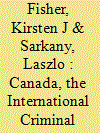

|
|
|
|
|
| Summary/Abstract |
In 2018, Prime Minister Trudeau made two announcements regarding the International Criminal Court, both, it seems, aimed at reinforcing Canada’s claim of human rights promotion and multilateralism: Canada declared Myanmar’s actions against the Rohingya people genocide and urged the United Nations Security Council to refer the situation to the International Criminal Court, and it joined a collective referral of the Venezuela situation to the Court. As public measures of support, these are positive developments for the International Criminal Court, which has been suffering poor public relations and challenges to its legitimacy. However, Canada could do more by better supporting the financial viability of the Court. Currently, it aims to increase the Court’s workload without supporting an increased budget, as reflected in Canada’s involvement at the December 2018 Assembly of States Parties meeting. A seemingly sure way to undermine the International Criminal Court would be to add to its workload without ensuring it has the financial resources to do the work.
|
|
|
|
|
|
|
|
|
|
|
|
|
|
|
|
| 2 |
ID:
167223
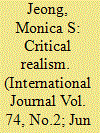

|
|
|
|
|
| Summary/Abstract |
The fundamental problem in middle power scholarship lies in the research design that inadvertently permits bias, tautology, and circularity in the process of realizing the final outcome. Most researchers begin with a presumption that middle powers are countries in the middle range of the world order, capable and willing to play some constructive roles beyond their borders. Thus, they tend to select methods and data compatible with the given presumption, and reach predictable outcomes that determine middle power status by middle power behaviours, or middle power behaviours by middle power status. This is an epistemic fallacy where the ontic category of middle powers is defined by the epistemic knowledge of middle powers. Eventually, any countries with comparable characteristics/behaviours to the given presumption can be classified as “middle powers” conducting middle power behaviours. This article offers critical realism as a much-needed remedy to the stagnant middle power scholarship. It examines a group of countries already categorized as middle powers—Mexico, Indonesia, South Korea, Turkey, and Australia (MIKTA)—under a critical realist framework, and finds that those countries and their activities cannot be generalized by the conventional middle power conception. In fact, the middle power rhetoric itself holds both a positive and negative ideological implication that requires further scrutiny. Yet, what makes the critical realist research design and its findings invaluable is the commitment to ontological realism, epistemological relativism, and judgmental rationalism that addresses the recurring epistemic fallacy. Therefore, the research findings are not merely new insights about “middle power” countries; they are a valid clue that can help uncover the “real” world that causes the so-called “middle power” categorization.
|
|
|
|
|
|
|
|
|
|
|
|
|
|
|
|
| 3 |
ID:
167227
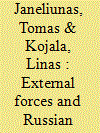

|
|
|
|
|
| Summary/Abstract |
This article analyzes the impact of external factors on Russia’s foreign policy. Specifically, it identifies patterns in Russia’s foreign policy reactions to two kinds of developments: changes in US foreign policy, and fluctuating global oil prices affecting Russia’s economy. Our hypothesis is that US foreign policy, as it is perceived by Putin’s regime, is the key determinant of the Kremlin’s reactions, while the changes in economic trends, affected by oil price, influence the regime’s preference to choose more confrontational or more defensive ways of action. As the analysis shows, different versions of national identity narratives can be constructed within Putin’s regime: it acts as a closed political system that can produce different foreign policy reactions and even ideological narratives without major changes in the governing elite.
|
|
|
|
|
|
|
|
|
|
|
|
|
|
|
|
| 4 |
ID:
167215
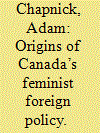

|
|
|
|
|
| Summary/Abstract |
In January 2019, a leading Canadian foreign policy blog, OpenCanada.org, declared that “[u]nder the government of Justin Trudeau, Canada has embraced a feminist foreign policy—gradually at first, and with fervor over the past year.” Although critics have debated the policy’s effectiveness, the embrace, if not also the fervor, was indisputable. By 2019, the Trudeau government’s second foreign minister, Chrystia Freeland, was proclaiming Canada’s feminist approach to international relations openly and regularly. The international community had also noticed. This article investigates the origins of the new Canadian foreign policy “brand.” It finds that, contrary to popular thinking, the prime minister himself played at most a minor role in the initiation of what became a full-fledged transformation of Canada’s global image.
|
|
|
|
|
|
|
|
|
|
|
|
|
|
|
|
| 5 |
ID:
167221


|
|
|
|
|
| Summary/Abstract |
Dating to the early Cold War, Canada and the US have disagreed on the status of the Northwest Passage. For Canada, the waters of the Arctic Archipelago are internal, historic waters. For the US, the sea route is an international strait. Despite this fundamental disagreement, cooperation between the two states in the Arctic has long been effective and friendly. In part, this can be attributed to decades of careful diplomacy, which has strategically set aside the intractable legal questions in favour of a comfortable “agree-to-disagree” arrangement. In the age of MAGA diplomacy under President Donald Trump, this successful system appears at risk. With discussion of Arctic freedom of navigation voyages for the US Navy becoming commonplace, and the old diplomatic safeguards breaking down in favour a new zero-sum foreign policy approach, Canada may soon face a new challenge to its Arctic sovereignty.
|
|
|
|
|
|
|
|
|
|
|
|
|
|
|
|
| 6 |
ID:
167231


|
|
|
|
|
| Summary/Abstract |
This essay examines how the history of the Cold War in Southeast Asia has shaped, and will likely continue to shape, the current Sino-US rivalry in the region. Expert commentary today typically focuses on the agendas and actions of the two big powers, the United States and China, which actually risks missing the bigger picture. During the Cold War, leaders of ASEAN (Association of Southeast Asian Nations) played a critical role in containing Chinese influence, shaping the terms of Sino-US competition and rapprochement, and deepening the US presence in Southeast Asia. The legacy of ASEAN’s foreign relations during and since the Cold War imposes constraints on Chinese regional ambitions today, which militates against the popular notion that Chinese hegemony in East and Southeast Asia is inevitable. This essay underscores that current analyses of the brewing crisis in and around the South China Sea must routinely look beyond the two superpowers to the under-appreciated agency of small- and middle-sized ASEAN actors who, in reality, are the ones who hold the fate of the region in their hands.
|
|
|
|
|
|
|
|
|
|
|
|
|
|
|
|
| 7 |
ID:
167230
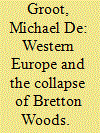

|
|
|
|
|
| Summary/Abstract |
This article contends that Western Europe played a crucial and overlooked role in the collapse of Bretton Woods. Most scholars highlight the role of the United States, focusing on the impact of US balance of payments deficits, Washington’s inability to manage inflation, the weakness of the US dollar, and American domestic politics. Drawing on archival research in Britain, Germany, the Netherlands, and the United States, this article argues that Western European decisions to float their currencies at various points from 1969 to 1973 undermined the fixed exchange rate system. The British, Dutch, and West Germans opted to float their currencies as a means of protecting against imported inflation or protecting their reserve assets, but each float reinforced speculators’ expectations that governments would break from their fixed parities. The acceleration of financial globalization and the expansion of the Euromarkets in the 1960s made Bretton Woods increasingly difficult to defend.
|
|
|
|
|
|
|
|
|
|
|
|
|
|
|
|
|
|
|
|
|